题型组合练 完成句子+选词填空 九年级下册英语期末复习 牛津译林版(含解析)
文档属性
| 名称 | 题型组合练 完成句子+选词填空 九年级下册英语期末复习 牛津译林版(含解析) |
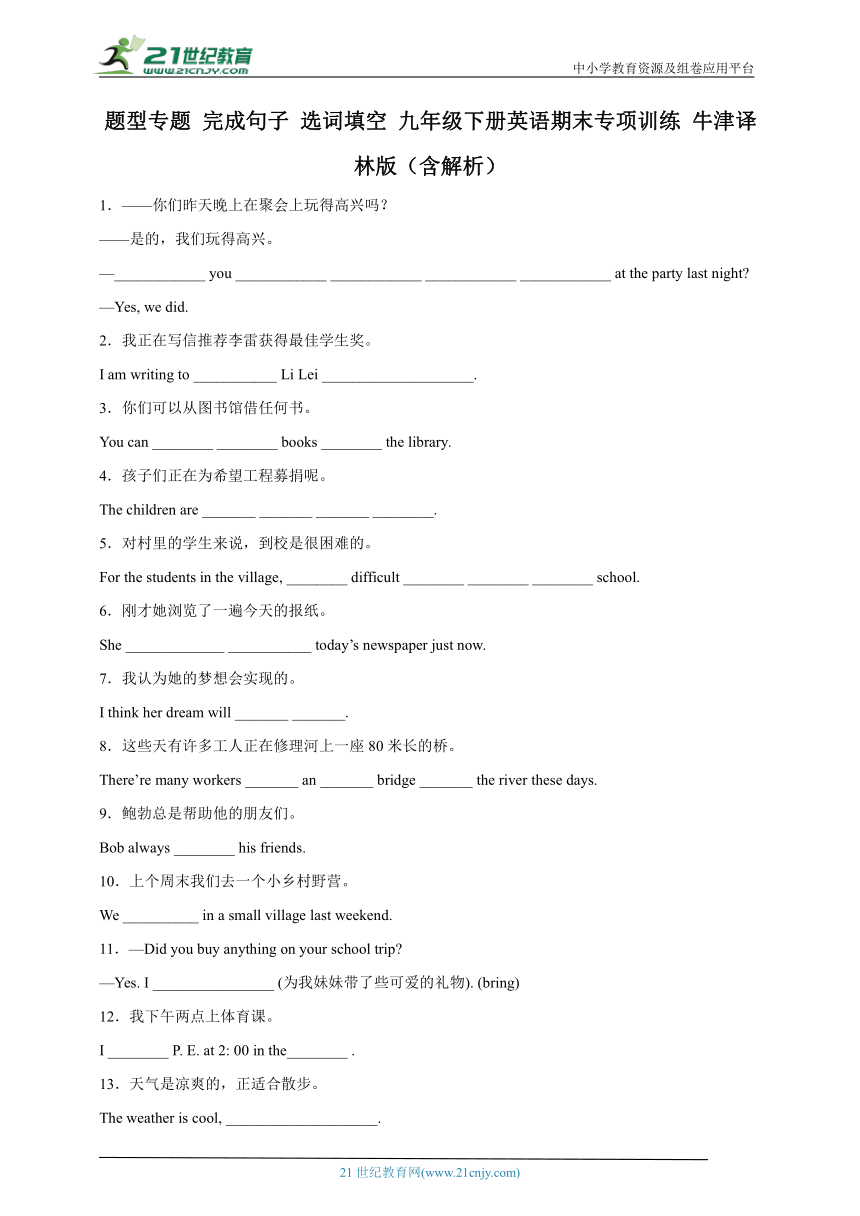
|
|
| 格式 | doc | ||
| 文件大小 | 878.9KB | ||
| 资源类型 | 试卷 | ||
| 版本资源 | 牛津译林版 | ||
| 科目 | 英语 | ||
| 更新时间 | 2023-05-30 00:00:00 | ||
图片预览

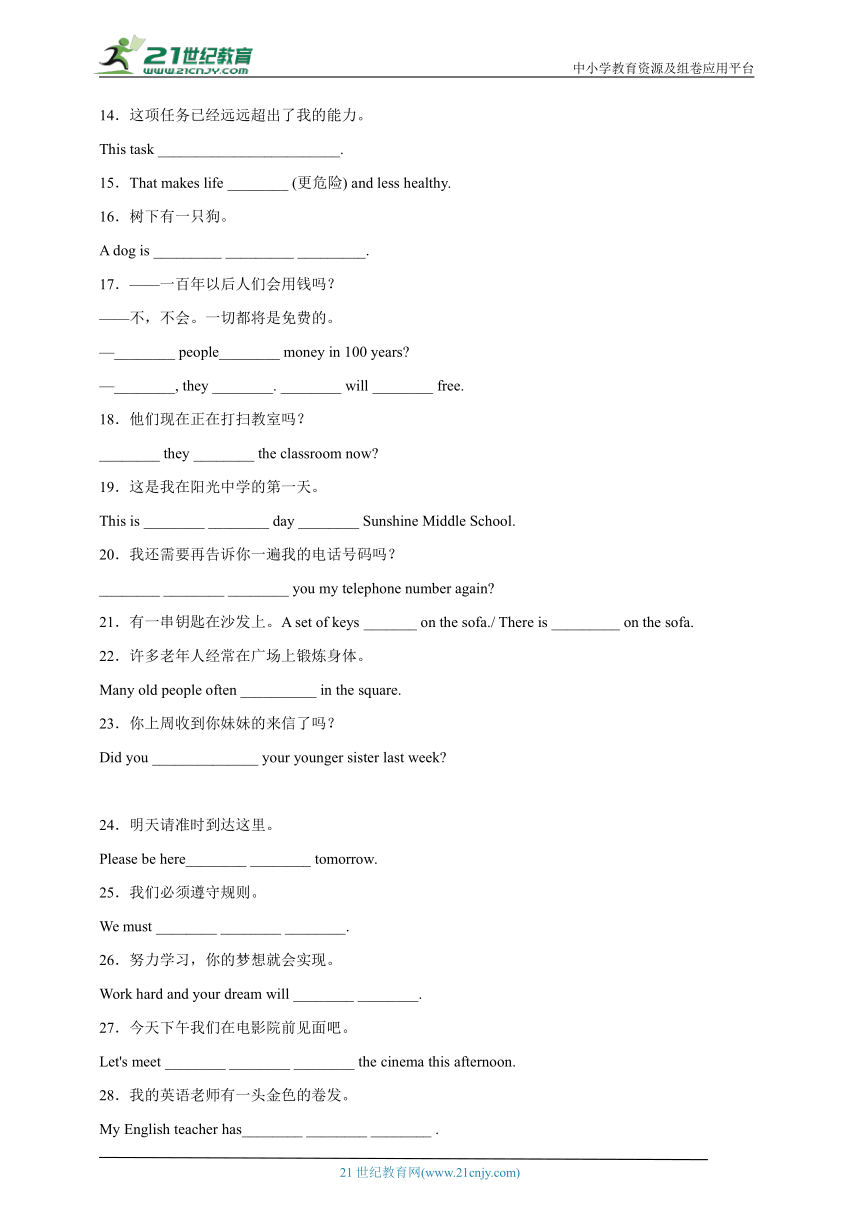
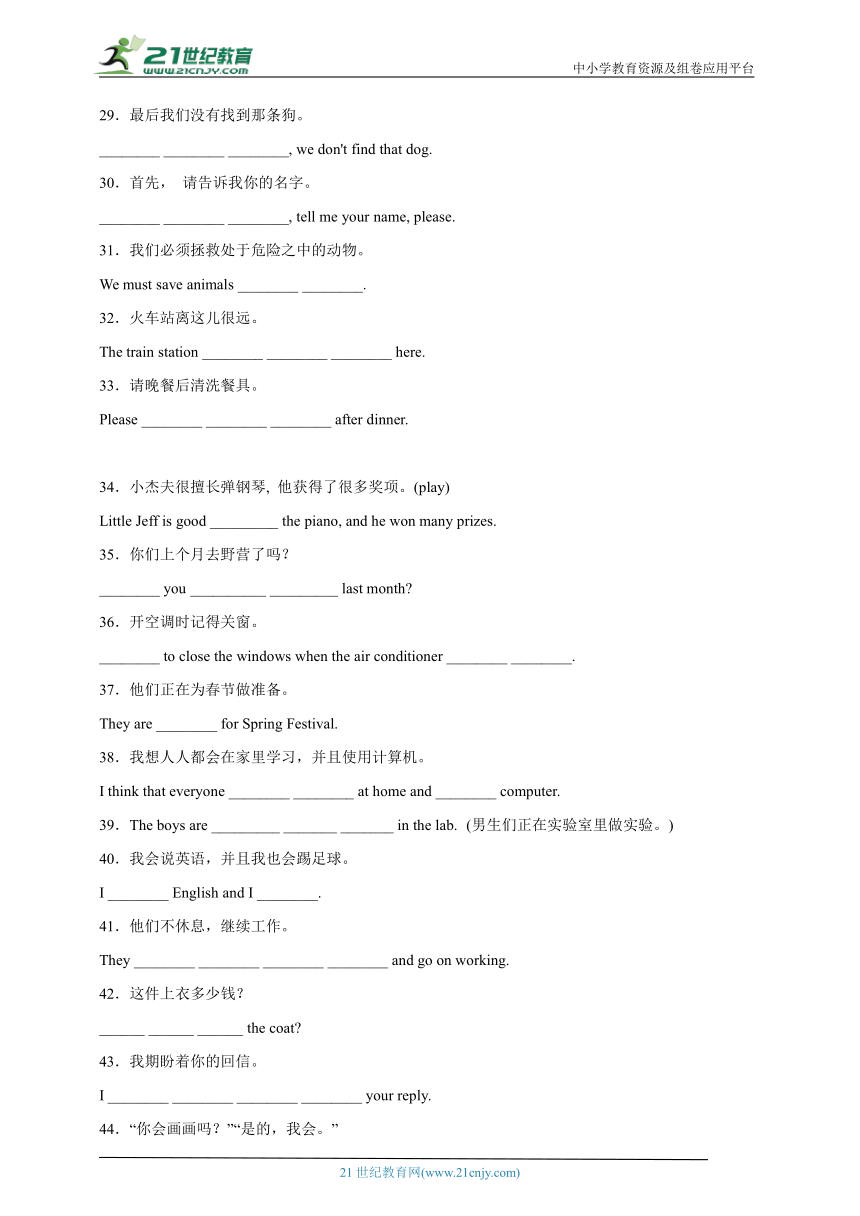
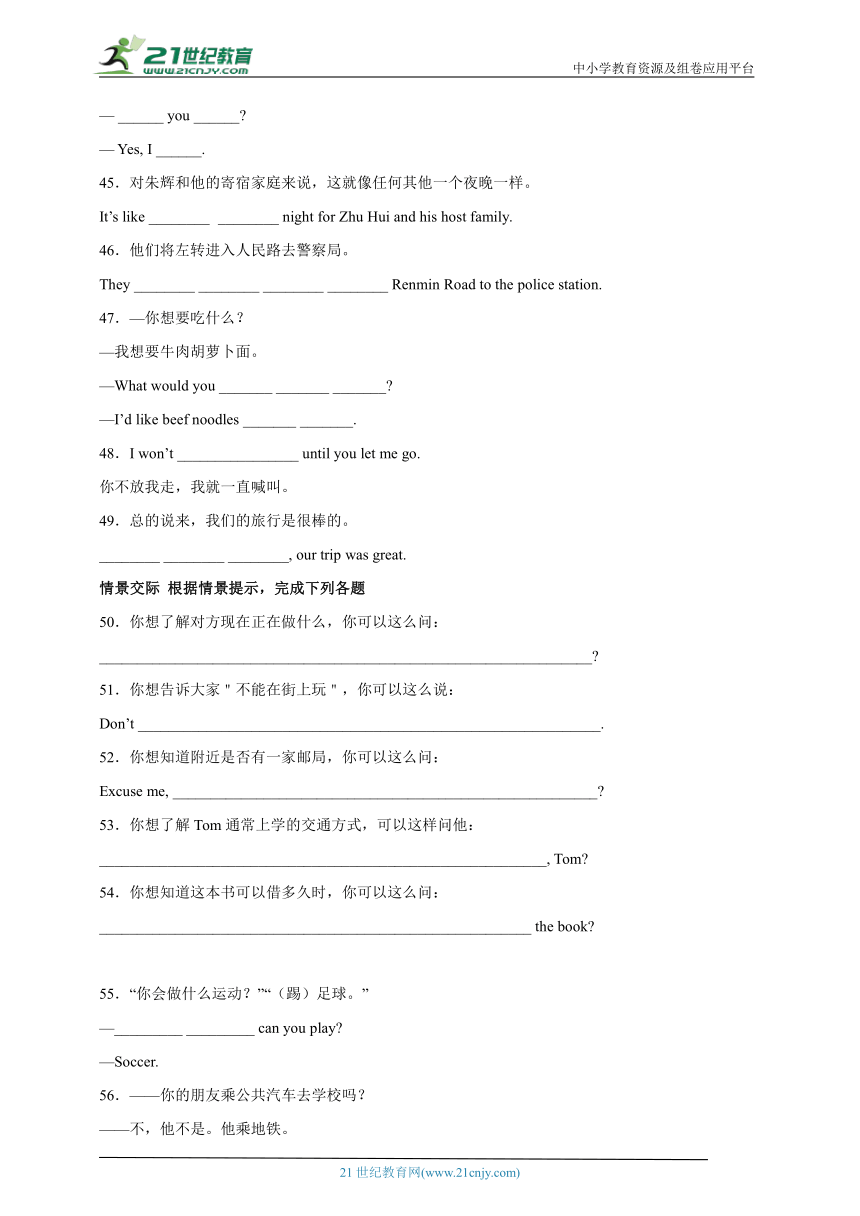
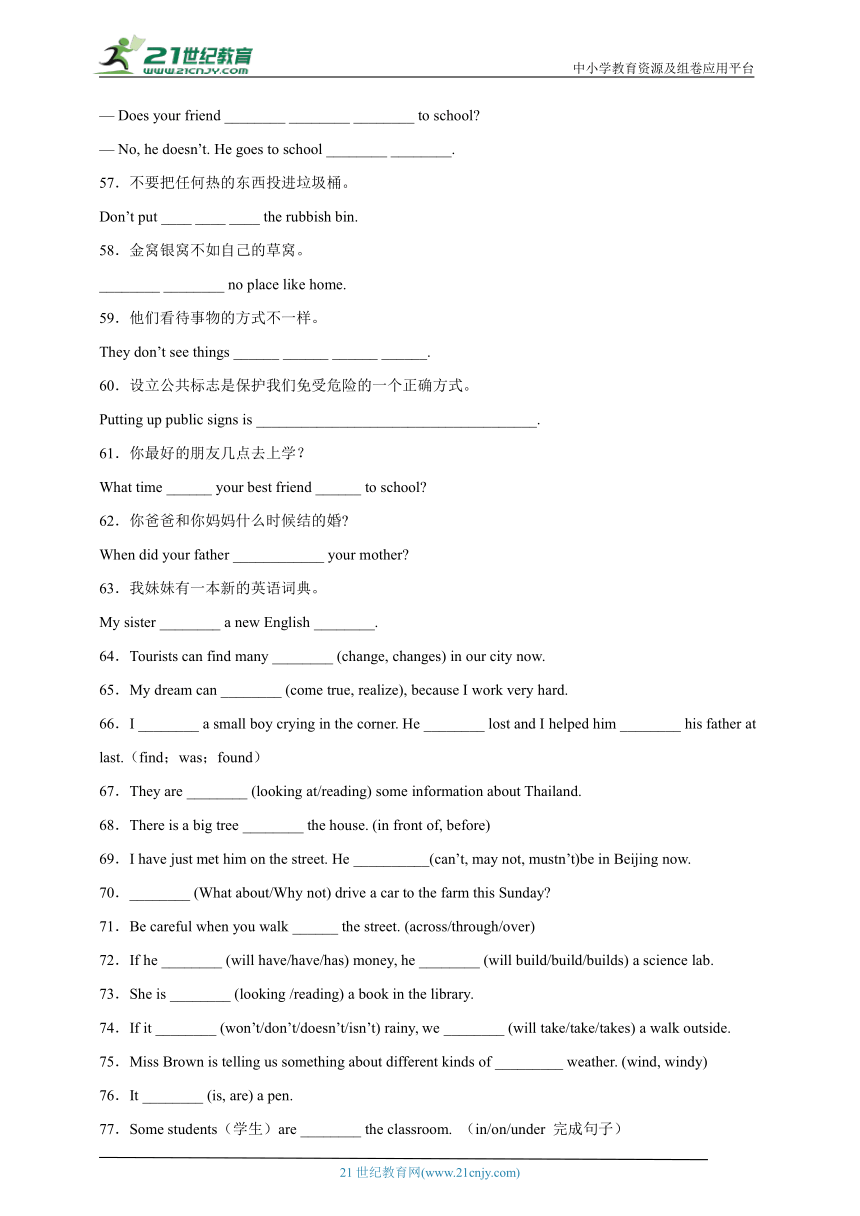
文档简介
中小学教育资源及组卷应用平台
题型专题 完成句子 选词填空 九年级下册英语期末专项训练 牛津译林版(含解析)
1.——你们昨天晚上在聚会上玩得高兴吗?
——是的,我们玩得高兴。
—____________ you ____________ ____________ ____________ ____________ at the party last night
—Yes, we did.
2.我正在写信推荐李雷获得最佳学生奖。
I am writing to ___________ Li Lei ____________________.
3.你们可以从图书馆借任何书。
You can ________ ________ books ________ the library.
4.孩子们正在为希望工程募捐呢。
The children are _______ _______ _______ ________.
5.对村里的学生来说,到校是很困难的。
For the students in the village, ________ difficult ________ ________ ________ school.
6.刚才她浏览了一遍今天的报纸。
She _____________ ___________ today’s newspaper just now.
7.我认为她的梦想会实现的。
I think her dream will _______ _______.
8.这些天有许多工人正在修理河上一座80米长的桥。
There’re many workers _______ an _______ bridge _______ the river these days.
9.鲍勃总是帮助他的朋友们。
Bob always ________ his friends.
10.上个周末我们去一个小乡村野营。
We __________ in a small village last weekend.
11.—Did you buy anything on your school trip
—Yes. I ________________ (为我妹妹带了些可爱的礼物). (bring)
12.我下午两点上体育课。
I ________ P. E. at 2: 00 in the________ .
13.天气是凉爽的,正适合散步。
The weather is cool, ____________________.
14.这项任务已经远远超出了我的能力。
This task ________________________.
15.That makes life ________ (更危险) and less healthy.
16.树下有一只狗。
A dog is _________ _________ _________.
17.——一百年以后人们会用钱吗?
——不,不会。一切都将是免费的。
—________ people________ money in 100 years
—________, they ________. ________ will ________ free.
18.他们现在正在打扫教室吗?
________ they ________ the classroom now
19.这是我在阳光中学的第一天。
This is ________ ________ day ________ Sunshine Middle School.
20.我还需要再告诉你一遍我的电话号码吗?
________ ________ ________ you my telephone number again
21.有一串钥匙在沙发上。A set of keys _______ on the sofa./ There is _________ on the sofa.
22.许多老年人经常在广场上锻炼身体。
Many old people often __________ in the square.
23.你上周收到你妹妹的来信了吗?
Did you ______________ your younger sister last week
24.明天请准时到达这里。
Please be here________ ________ tomorrow.
25.我们必须遵守规则。
We must ________ ________ ________.
26.努力学习,你的梦想就会实现。
Work hard and your dream will ________ ________.
27.今天下午我们在电影院前见面吧。
Let's meet ________ ________ ________ the cinema this afternoon.
28.我的英语老师有一头金色的卷发。
My English teacher has________ ________ ________ .
29.最后我们没有找到那条狗。
________ ________ ________, we don't find that dog.
30.首先, 请告诉我你的名字。
________ ________ ________, tell me your name, please.
31.我们必须拯救处于危险之中的动物。
We must save animals ________ ________.
32.火车站离这儿很远。
The train station ________ ________ ________ here.
33.请晚餐后清洗餐具。
Please ________ ________ ________ after dinner.
34.小杰夫很擅长弹钢琴, 他获得了很多奖项。(play)
Little Jeff is good _________ the piano, and he won many prizes.
35.你们上个月去野营了吗?
________ you __________ _________ last month
36.开空调时记得关窗。
________ to close the windows when the air conditioner ________ ________.
37.他们正在为春节做准备。
They are ________ for Spring Festival.
38.我想人人都会在家里学习,并且使用计算机。
I think that everyone ________ ________ at home and ________ computer.
39.The boys are _________ _______ _______ in the lab. (男生们正在实验室里做实验。)
40.我会说英语,并且我也会踢足球。
I ________ English and I ________.
41.他们不休息,继续工作。
They ________ ________ ________ ________ and go on working.
42.这件上衣多少钱?
______ ______ ______ the coat
43.我期盼着你的回信。
I ________ ________ ________ ________ your reply.
44.“你会画画吗?”“是的,我会。”
— ______ you ______
— Yes, I ______.
45.对朱辉和他的寄宿家庭来说,这就像任何其他一个夜晚一样。
It’s like ________ ________ night for Zhu Hui and his host family.
46.他们将左转进入人民路去警察局。
They ________ ________ ________ ________ Renmin Road to the police station.
47.—你想要吃什么?
—我想要牛肉胡萝卜面。
—What would you _______ _______ _______
—I’d like beef noodles _______ _______.
48.I won’t ________________ until you let me go.
你不放我走,我就一直喊叫。
49.总的说来,我们的旅行是很棒的。
________ ________ ________, our trip was great.
情景交际 根据情景提示,完成下列各题
50.你想了解对方现在正在做什么,你可以这么问:
_________________________________________________________________
51.你想告诉大家"不能在街上玩",你可以这么说:
Don’t _____________________________________________________________.
52.你想知道附近是否有一家邮局,你可以这么问:
Excuse me, ________________________________________________________
53.你想了解Tom通常上学的交通方式,可以这样问他:
___________________________________________________________, Tom
54.你想知道这本书可以借多久时,你可以这么问:
_________________________________________________________ the book
55.“你会做什么运动?”“(踢)足球。”
—_________ _________ can you play
—Soccer.
56.——你的朋友乘公共汽车去学校吗?
——不,他不是。他乘地铁。
— Does your friend ________ ________ ________ to school
— No, he doesn’t. He goes to school ________ ________.
57.不要把任何热的东西投进垃圾桶。
Don’t put ____ ____ ____ the rubbish bin.
58.金窝银窝不如自己的草窝。
________ ________ no place like home.
59.他们看待事物的方式不一样。
They don’t see things ______ ______ ______ ______.
60.设立公共标志是保护我们免受危险的一个正确方式。
Putting up public signs is _____________________________________.
61.你最好的朋友几点去上学?
What time ______ your best friend ______ to school
62.你爸爸和你妈妈什么时候结的婚
When did your father ____________ your mother
63.我妹妹有一本新的英语词典。
My sister ________ a new English ________.
64.Tourists can find many ________ (change, changes) in our city now.
65.My dream can ________ (come true, realize), because I work very hard.
66.I ________ a small boy crying in the corner. He ________ lost and I helped him ________ his father at last.(find;was;found)
67.They are ________ (looking at/reading) some information about Thailand.
68.There is a big tree ________ the house. (in front of, before)
69.I have just met him on the street. He __________(can’t, may not, mustn’t)be in Beijing now.
70.________ (What about/Why not) drive a car to the farm this Sunday
71.Be careful when you walk ______ the street. (across/through/over)
72.If he ________ (will have/have/has) money, he ________ (will build/build/builds) a science lab.
73.She is ________ (looking /reading) a book in the library.
74.If it ________ (won’t/don’t/doesn’t/isn’t) rainy, we ________ (will take/take/takes) a walk outside.
75.Miss Brown is telling us something about different kinds of _________ weather. (wind, windy)
76.It ________ (is, are) a pen.
77.Some students(学生)are ________ the classroom. (in/on/under 完成句子)
78.The sunshine goes _______ the window. (across/through/over)
79.These are ________ (he, him, his) planes.
80.—Where did Tom go on vacation
—He ________ to the mountains.(go; went)
81.She ________ (are/is) at the library.
82.Don’t walk _________ (through/across) the busy road.
83.________ (For, with) many students, it is easy to get to school.
84.Kate ________ ate apples before, but now she ________ eats them because they are good for her health. (often, seldom)
85.A strong wind may blow away flower pots ________ people’s flat. (outside, inside)
86.He jumped ________ the wall. (across/through/over)
87.The boat is _________ (on/over) the river.
88.Tom can’t get down from the tree. Can you help ________ (he, him, his)
89.They have ____________(ever; never)been to London, so they want to go there.
90.Ricky goes running every morning and he is ________ healthy. (always, never)
91.Where do animals live ________ (on, in) Earth
92.—What’s that in English
—________ (It’s, That’s) a blue quilt.
93.What do you think Jerry will ________ (bring, take) back from the Moon
94.—________ (What’s/Where’re) in your bag
—Some photos.
95.She is ____________ (runing/running) on the playground.
96.In ________ (spring, autumn) , trees turn brown.
97.He ________ goes to school by bus. But today he wants to go to school on foot. (seldom, usually)
98.She is ________ (dislike, unlike) her mother. She is tall, but her mother is short.
99.________ (Will/Do/Does) he visit the museum if he ________ (won’t/don’t/doesn’t) get tired
100.How ________ (much, many) students are there in your class
101.— ________ you at home last Sunday
— No, I ________. I ________ in the park with my family.(were;was;wasn’t)
102.I think that snowman is very ________(fun, funny).
103.I can swim ________ (cross, across) the river.
104.— ________ the tickets expensive yesterday evening
— No, they ________. And there ________ many things to see.(were;weren’t)
105.We’ll ________ stay there for two hours. (must, have to)
106.I haven’t got ________ (some, any) money.
107.________ (What, Why) can we do to protect the Earth
108.She likes studying and ____________ (sometimes; usually) comes to school early.
109.There aren’t ___________ (some/any) houses on the right of the road.
110.My grandfather ________ watches TV after dinner. It’s his habit. (often, never)
111.Do you usually ________ (take a subway, take the subway) to go to school
112.Jim doesn’t want ________ (some/any) pink T-shirts.
113.There is a car in _________ front of our house, and the driver is in _________ front of it.(the或者不填)
参考答案:
1. Did have a good time
【详解】根据中英文对照可知,所缺部分的意思为“玩得高兴”,可用动词短语have a good time,再由“Yes, we did.”可知,此句为一般疑问句,时态为一般过去时,所以第一空为助动词did,句首首字母大写,第二、三、四、五空为have a good time。故填Did;have;a;good;time。
2. recommend for the Best Student Award
【详解】“推荐某人获得某物”recommend sb. for sth.;“最佳学生奖”the Best Student Award。to后接动词原形构成不定式。故填recommend;for the Best Student Award。
3. borrow any from
【详解】根据中英文对照分析可知,borrow“借”,动词,作谓语,位于情态动词can后,用原形;any“任何的”,形容词,修饰books;from“来自于……,从……”。故填borrow;any;from。
4. raising money for Project Hope
【详解】raise money“募捐”,此处动词应用现在分词和are构成现在进行时;for“为了”,介词;Project Hope“希望工程”。故填raising;money;for;Project Hope。
5. it’s to get to
【详解】此处可以用“It’s+adj+to do sth”的结构,表示“做某事是怎么样的”,get to school“到校”,固定短语,故填it’s;to;get;to。
6. looked through
【详解】look through浏览,根据just now可知此处用一般过去时,故为(1). looked (2). through 。
7. come true
【详解】空格上缺少动词短语“实现”come true。根据will后加动词原形。故填come;true。
8. fixing/repairing 80-metre-long over
【详解】根据中文及所给英文可知,第一空考查动词fix/repair“修理”,且There’re后接现在分词形式,用fixing/repairing;第二空考查复合形容词80-metre-long“80米长的”;第三空考查介词over“在……上方”。故填fixing/repairing;80-metre-long;over。
9.helps
【详解】帮助:help;描述一般性动作,用一般现在时,主语是Bob,谓语用第三人称单数。故填helps。
10.went camping
【详解】根据中英文对照可知,此处考查短语go camping“去野营”。根据“last weekend”可知,本句是一般过去时,故go用其过去式。故填went camping。
11.bought some lovely gifts for my sister
【详解】句意:——你在学校旅行时买了什么东西吗?——是的。我为我妹妹带了些可爱的礼物。buy sth for sb“为某人买某物”;some lovely gifits“一些可爱的礼物”;my sister“我的妹妹”。结合上句可知是一般过去时,故填bought some lovely gifts for my sister。
12. have afternoon
【详解】have P.E.上体育课,in the afternoon在下午,故为(1). have (2). afternoon。
13.just right for walking
【详解】通过中英文句子对照可知,英文句子中缺少“正适合散步”的表达;“正适合”英文表达是just right for;“散步”英文表达是walk;for是介词,所以此处应用walk的ing形式walking。故填just right for walking。
14.has gone far beyond my ability/has gone far beyond my abilities/ has been far beyond my ability/has been far beyond my abilities
【详解】go far beyond或be far beyond“远远超过”;my ability/abilities“我的能力”,根据“已经”可知,此句用现在完成时have/has done的结构,主语是单数形式,助动词用has,故填has gone/been far beyond my ability/abilities。
15.more dangerous
【详解】句意:那使生活更危险、更不健康。由句子结构可知,该空与后面 less healthy是并列关系,应填形容词的比较级形式。结合单词的意思可知,这里考查dangerous危险的,故答案为more dangerous。
16. under the tree
【详解】根据中英文可知,此处空对应的中文为“树下”,under the tree“树下”,为方位介词短语。故填under;the;tree。
17. Will use No won’t Everything be
【详解】根据汉语可知,第一句是一般将来时的一般疑问句,“将会”will放句首,后跟动词原形;“使用”use;否定回答用“No,主语+won’t”;“一切”everything;will后跟动词原形,be“是”。故填Will;use;No;won’t;Everything;be。
18. Are cleaning
【详解】clean“打扫”,动词。分析句意可知此处是现在进行时,主语是they,be动词用are,一般疑问句中需要把be动词提到主语前。故填Are;cleaning。
19. the first in
【详解】根据所给中英文可知要翻译的是“第一天”及“在”。“第一”对应的英文是“first”,修饰“day”故序数词前加“the”;“在……学校”应用介词“in”。故填the;first;in。
20. Need I tell
【详解】根据所给的汉语和英语翻译可知,“需要”译成:need;“告诉”译成:tell;“我”译成:I。这里是一般疑问句,需要把情态动词need提前大写,后跟动词原形。故填Need;I;tell。
21. is a set of keys
【详解】根据a set of看作是单数;故填is;根据a set of一串,可知钥匙是复数;故填a set of keys。
22.get some exercise
【详解】由“Many old people often…”可知,本句陈述规律性动作,故为一般现在时,主语many old people为复数,故谓语动词用其原形;get some exercise“锻炼身体”,exercise作“锻炼”讲时为不可数名词。故填get some exercise。
23.hear from
【详解】“收到某人的来信”hear from sb,固定短语,助动词did后跟动词原形,故填hear from。
24. on time 25. obey the rules 26. come true 27. in front of 28. golden curly hair 29. In the end 30. First of all 31. in danger 32. is far from 33. do the dishes
【解析】24. 明天请准时到达这里。 on time 按时;故填 (1). on (2). time
25. 我们必须遵守规则。 obey the rules 遵守规则 ;故填 (1). obey (2). the (3). rules
26.努力学习,你的梦想就会实现。 come . true(梦想)成真 ;will后用动词原形;故填 (e (2). true
27.今天下午我们在电影院前见面吧。 in front of 在---前面(在物体的外部);故填 (1). in (2). front (3). of
点睛:in the front of 指的是内部范围,例如:in the front of the classroom指的是教室里面的前面,像讲台,它是包含在教室里面的;in front of 指的是外部范围,例如:in front of the classroom指的是教室外面的某个地方。
28.我的英语老师有一头金色的卷发。 golden 金色的; curly 卷曲的; hair 头发,不可数名词;故填 (1). golden (2). curly (3). hair
29.最后我们没有找到那条狗。in the end 最后,终于;故填 (1). In (2). the (3). end
30. 首先, 请告诉我你的名字。first of all首先;故填 (1). First (2). of (3). all
31.我们必须拯救处于危险之中的动物。 in danger 处于危险之中;故填 (1). in (2). danger
32.火车站离这儿很远。 be far from 远离;根据主语The train station单数,所以用is;故填 (1). is (2). far (3). from
33. 请晚餐后清洗餐具。do the dishes洗餐具,祈使句用动词原形;故填 (1). do (2). the (3). dishes
34.at playing
【详解】be good at doing sth. 擅长做某事,固定短语。故填at playing。
35. Did go camping
【详解】上个月是表示过去的时间,所以句子用一般过去时态。go camping野营。一般过去时态的句子变一般疑问句时,要用助动词did,并把助动词提前,谓语动词还原,故填Did;go; camping。
36. Remember is on
【详解】remember“记得”,是动词。根据句意可知,这是祈使句,动词应用原形;be on此处表示空调开着的状态,主语是单数,be动词用is。故填Remember;is;on。
37.getting ready
【详解】根据中英文对照可知,此处缺少“为……做准备”,其英文表达为get ready for;空处需用现在分词形式getting与be动词are构成现在进行时。故填getting ready。
38. will study use
【详解】表示对未来的畅想,用一般将来时,will do结构,study表示“学习”,use表示“使用”,and连接并列的谓语动词,且用原形。故填will;study;use。
39. doing an experiment
【详解】根据中英文对照可知,空格处缺少“正在做实验”。do an experiment“做实验”,是固定表达;由原句是现在进行时可知谓语动词do要用现在分词doing。故填doing;an;experiment。
40. can speak can also play soccer
【详解】会:can,情态动词,后加动词原形;说:speak;踢足球:play soccer;也:also,位于情态动词之后。故填can speak;can also play soccer。
41. don’t have a break/rest
【详解】根据句意可知,此句为否定句,空缺处填“不休息”;根据语境可知,本句时态为一般现在时;第三人称复数作主语,助动词为“don’t”表否定;动词短语have a break/rest,表示 “休息”,助动词后用动词原形。故填don’t;have;a;break/rest。
42. How much is
【详解】根据汉语提示,这里是提问价格,用How much来提问,主语是the coat,这里用be动词is。根据汉语,故填How;much;is。
43. am looking forward to
【详解】期盼某事:look forward to sth;根据中文提示可知,句子时态用现在进行时(am/is/are doing),主语是I,be动词用am。故填am;looking;forward;to。
44. Can draw can
【详解】根据语境,可知是含情态动词的一般疑问句,can“能”,是情态动词,把can提前构成一般疑问句,draw“绘画”,是动词,Can+主语+动词原形+其他?作简略回答,用情态动词can作简略回答,故填Can;draw;can。
45. any other
【详解】根据句子结构可知空处应填“任何其他”,any other+单数名词,表示“任何其他……”,night是单数名词,any other符合,故填any;other。
46. will turn left into
【详解】根据汉语可知,句子时态是一般将来时,will“将”,后跟动词原形;“左转”turn left;“进入”into。故填will;turn;left;into。
47. like to eat with carrots
【详解】“想要吃……”译为“would like to eat...”,“牛肉胡萝卜面”译为“beef noodles with carrots”。故填like;to;eat;with;carrots。
48.stop shouting
【详解】shout“喊叫”;stop doing sth.表示“停止做某事”;won’t后跟动词原形。故填stop shouting。
49. All in all
【详解】由中英文对比可知,缺少“总的说来”,英文表达为all in all,介词短语;设空处在句首,首字母“a”要大写。故填All;in;all。
50.What are you doing now 51.play on the street 52.is there a post office near here 53.How do you usually come/go to school 54.How long can I keep
【解析】50.想了解对方正在做什么,要用现在进行时。句子的主语用第二人称。故答案为What are you doing now.
51.告诉对方不要做某事,可以用祈使句的否定形式,don’t+动词原形。on the street在街上。 故答案为play on the street。
52.表示问某地有什么,可以用there be句型的一般疑问句来问。near here这里附近。故答案为is there a post office near here。
53.问上学的交通方式应该用疑问词how,ome/go to school上学;故答案为How do you usually come/go to school。
54.表示多久用疑问词how long,它与持续性动词连用,所以这里的借不能用非持续性动词borrow,而用持续性动词keep。故答案为How long can I keep。
55. What sports
【详解】分析句子可知空处应填“什么运动”。play sports“做运动”,是固定表达,此处是特殊疑问句,应用what引导,后加sports。故填What;sports。
56. take the bus by subway
【详解】乘公共汽车:take the bus;乘地铁:by subway;一般现在时态的一般疑问句,主语是第三人称单数,其结构是“Does+主语+动词原形+其他?” take the bus在句中作谓语;下文回答是介词短语作状语,go to school by subway“乘地铁去学校”,故填take;the;bus;by;subway。
57. anything hot into
【详解】根据所给汉语意思可知,空缺处应该填的是“投进”和“任何热的东西”,动词短语put sth into…“把某物投进……”,复合不定代词anything“任何东西”,形容词hot“热的”修饰复合不定代词时,要放在后面,故填anything;hot;into。
58. There is
【详解】此句可转化为没有一个地方像家一样。固定句型表示有……there be,no place作单数,be动词用单数形式is。故填There is。
59. in the same way
【详解】因为句子中已经有否定词don’t,所以要翻译相同的方式;方式way,相同的the same,固定搭配相同的方式in the same way。故答案填in the same way。
60.a proper way to keep us from danger
【详解】由英汉对照可知,空格处填“保护我们免受危险的一个正确方式”;a proper way to do sth.做某事的一个正确的方式;keep sb. from danger使某人远离危险,“保护我们免受危险”表达为keep us from danger。故填a proper way to keep us from danger。
61. does go
【详解】“去上学”译为“go to school”。谓语动词“go”是实义动词,主语“your best friend”前用助动词does,其后谓语动词用原形。故填does;go。
62.get married to
【详解】疑问句是一般过去时,助动词“did”放在主语“your father”前,主语后接动词原形。表示“结婚”用动词短语“get married to”。故填get married to。
63. has dictionary
【详解】表示人有某物用have,主语是单数名词,动词用三单形式has;dictionary“字典”,是可数名词,空前有a修饰,名词应用单数形式,故填has,dictionary。
64.changes
【详解】句意:游客现在可以发现我们城市的许多变化。change表示“变化”,作名词是可数名词,many修饰名词的复数形式,故填changes。
65.come true
【详解】句意:我的梦想可以实现,因为我非常努力。come true(梦想)实现;realize实现,意识到,及物动词。分析句子结构可知,because引导原因状语从句,主句为“主语+谓语”的结构,因此动词应不及物,用come true,情态动词“can”后接动词原形。故填come true。
66. found was to find/find
【详解】句意:我发现一个小男孩在角落里哭。他迷路了,我最后帮他找到了他的父亲。根据所给词可知,第一个空格所在句说的是发现一个小男孩在角落里哭,考查的是find sb. doing sth“发现某人正在做某事”,根据后文“I helped him”可知,句子叙述的是过去发生的事情,故时态属于一般过去时,故填found;第二个空格所在句考查的是be lost“迷路”,根据“I helped him”可知,空格处要填过去式,根据句中的主语He是第三人称单数,其对应的be动词为was,故第二个空格填was;根据help的用法help sb. (to) do sth“帮助某人做某事”可知,第三个空格所填词为(to) find。故填found;was;(to)find。
67.reading
【详解】句意:他们正在阅读一些关于泰国的信息。look at“看”;read“读”;根据“some information...”可知是在读一些信息。故填reading。
68.in front of
【详解】句意:在房子前面有一棵大树。in front of表示在事物外面的前面;before表示位置关系,还可以表示时间和逻辑次序上的先后关系。此处表示大树在房子前面,用介词in front of,故填in front of。
69.can’t
【详解】句意:我刚刚已经在马路上见过他。他现在不可能在北京。can’t不可能;may not可能不;mustn’t禁止。根据“I have just met him on the street”可知,此处应用can’t表有把握的推测,即“不可能在北京,因为我刚才还见过他”。故填can’t。
70.Why not
【详解】句意:这个星期天为什么不开车去农场呢?what about doing sth“做某事怎么样”;why not do sth“为什么不做某事”,空格后是动词原形drive,故此空应填Why not,故填Why not。
71.across
【详解】句意:你过马路时要小心。across横过,指从物体表面上过去;through穿过,指物体内部空间穿过;over穿过,动词。根据句意,指的是过马路,从物体表面过去。故选across。
72. has will build
【详解】句意:如果他有钱,他会建一个科学实验室。句中“If”意为“如果”,引导条件状语从句,从句中用一般现在时,从句主语“he”为第三人称单数,谓语动词用第三人称单数has;主语用一般将来时,其构成为“will do”,第二空用will build。故填has;will build。
73.reading
【详解】句意:她正在图书馆看书。look“看起来”;read“读,阅读”,read a book“读书”,故填reading。
74. isn’t will take
【详解】句意:如果不下雨,我们就出去散步。句子是if引导的条件状语从句,时态遵循“主将从现”的原则,if引导的从句应用一般现在时,rainy是形容词,此处应用be动词,构成系表结构,否定应是isn’t,第二句是主句,应用一般将来时,结构是will+动词原形,故填isn’t;will take。
75.windy
【详解】句意:布朗小姐正在告诉我们一些关于不同类型刮风天气的事。此处填形容词windy“有风的”作定语。故填windy。
76.is
【详解】句意:它是一支钢笔。主语是it,be动词用is。故填is。
77.in
【详解】句意:一些学生在教室里。根据“the classroom”可知,学生在教室里,in“在……里面”。故填in。
78.through
【详解】句意:阳光照进窗户。across表示从物体表面横穿,比如穿过马路;through表示从物体内部穿过,比如从水中穿过,从森林穿过,阳光从玻璃中穿过;over表示从某物的正上方跨越。根据“The sunshine goes...the window.”可知,阳光从窗户中照射进来,应用through。故填through。
79.his
【详解】句意:这些是他的飞机。空后有名词planes,故此空应该用形容词性物主代词his。故填his。
80.went
【详解】句意:——Tom去哪度假了?——他去了山上。根据“did”可知,本题时态为一般过去时,所以动词应使用过去式went。故填went。
81.is
【详解】句意:她在图书馆。主语“She”为第三人称单数,be动词应用is。故填is。
82.across
【详解】句意:不要穿过这条繁忙的路。through“穿过”,强调从物体内部穿过;across“穿过”,强调从物体表面穿过。从道路表面穿过,应用across。故填across。
83.For
【详解】句意:对许多学生来说,到达学校很容易。for“对于”;with“和某人一起”。根据后句“it is easy to get to school.”语境可知,应是对许多学生来说,故空处应是for,句首首字母大写。故填For。
84. seldom often
【详解】句意:Kate以前很少吃苹果,但是现在她经常吃它们,因为它们对她的健康有好处。根据“because they are good for her health”可知,此处指Kate以前很少吃苹果,现在经常吃,seldom“很少”,often“经常”,故填seldom;often。
85.outside
【详解】句意:大风可能会吹走人们公寓外面的花盆。根据“A strong wind may blow away flower pots…people’s flat”可知,大风会吹走放在公寓外的花盆,outside“在外面”符合,故填outside。
86.over
【详解】句意:他跳过了墙。across指从某物的表面“穿过”;through指从某物的内部“穿过”;over指从某物上方“越过,翻过”。根据“He jumped ... the wall.”可知此处指从墙上翻过。故填over。
87.on
【详解】句意:船在河上。on在……上,强调接触;over在……上方,不接触。船和水是接触的,应用on。故填on。
88.him
【详解】句意:汤姆不能从树上下来。你能帮他吗?he他,主格代词;him他,宾格代词;his他的,形容词性物主代词。空处作help的宾语,需用宾格代词him。故填him。
89.never
【详解】句意:他们从没有去过伦敦,所以他们想要去那里。ever“曾经”,never“从未”。根据“so they want to go there.”可知,他们从没有去过那里才会想要去。故填never。
90.always
【详解】句意:Ricky每天早上跑步,他一直很健康。根据“Ricky goes running every morning”可知,此处指Ricky一直很健康,always“总是,一直”,故填always。
91.on
【详解】句意:动物生活在地球上的什么地方?on“在……上面”;in“在……里面”。由句中“live...Earth”可知,此句是说动物生活在地球上的什么地方,故填on。
92.It’s
【详解】句意:——那用英语怎么说?——它是一条蓝色的被子。根据“What’s that”可知,其回答是It’s...。故填It’s。
93.bring
【详解】句意:你认为杰瑞会从月球带回什么?bring“带来”,指把某物从别处带来;take“拿走”,指把某物带到别处。根据“back from the Moon”可知,此处指bring sth. back from sp.“把某物从某处带来”。故填bring。
94.What’s
【详解】句意:——你包里有什么?——有些照片。根据答语“Some photos.”可知,询问是什么,故填What’s。
95.running
【详解】句意:她正在操场上跑步。run的现在分词是running,故填running。
96.autumn
【详解】句意:在秋天,树叶变成褐色。根据“trees turn brown”可知是秋天的特点,故填autumn。
97.usually
【详解】句意:他通常乘公共汽车去上学。但是今天他想步行去上学。根据“But today he wants to go to school on foot”可知,此处指他通常乘车去上学,usually“通常”,故填usually。
98.unlike
【详解】句意:她不像她母亲。 她很高,但她妈妈很矮。根据“She is tall, but her mother is short.”她高,但她妈妈矮,可知她不像她妈妈,因此unlike“不像”符合题意,而dislike“不喜欢”语意不通,故填unlike。
99. Will doesn’t
【详解】句意:如果他不累的话,他会去参观博物馆吗?本题是if“如果”引导的条件状语从句,主句是一般将来时,结构是“will+动词原形”,从句是一般现在时,主语he是第三人称单数,助动词用doesn’t。又根据标点可知,本句是疑问句,需把助动词will提在主语前,并大写首字母。故填Will;doesn’t。
100.many
【详解】句意:你们班有多少个学生?much修饰不可数名词,many修饰可数名词,根据空后是可数名词复数students可知,此处用many修饰。故填many。
101. Were wasn’t was
【详解】句意:——你上个周日在家吗?——没有,我不在,我和我的家人在公园里。根据“last Sunday”可知,用一般过去时。第一空处主语为you,用were,开头字母要大写;第二空处,根据“No”可知,用一般过去时的否定形式,主语为I,用wasn’t;第三空处根据句意可知,表示“上个周日我和我的家人在公园”,用一般过去时,主语为I,用was。故填Were;wasn’t;was。
102.funny
【详解】句意:我觉得那个雪人很有趣。空处的词在系动词is之后,应用形容词funny“有趣的”。故填funny。
103.across
【详解】句意:我能游过这条河。句中有谓语动词swim,此处应用介词across“穿过”,故填across。
104. Were weren’t were
【详解】句意:——昨天晚上票贵吗?——不,不贵,有许多东西可以看。根据“yesterday evening”可知,用一般过去时。第一空处主语为“the tickets”,用were,开头字母要大写;第二空处,根据“No”可知,要否定回答,主语为“they”,用were’t;第三空处,是there be结构,根据“many things”可知,用were。故填Were;weren't;were。
105.have to
【详解】句意:我们将不得不在那儿待两个小时。“must”侧重与说话者的主观看法,认为有必要或有义务做某事;“have to”侧重于客观需要,含有“不得不”或“被迫”之意;“have to”有人称、数和时态的变化;可用于现在时、过去时或将来时。根据“We’ll”可知是一般将来时,表示“客观上不得不待在那儿”,用“have to”。故填have to。
106.any
【详解】句意:我没有钱。some“一些”,常用于肯定句中;any“一些”,用于疑问句或否定句中。本句是否定句,故用any。故填any。
107.What
【详解】句意:我们可以做些什么来保护地球?动词do为及物动词,后面需要带宾语,而疑问句中缺少宾语,因此应用疑问词what“什么”来充当宾语,并引导特殊疑问句。故填What。
108.usually
【详解】句意:她喜欢学习,通常很早就到校。sometimes有时;usually通常。根据“She likes studying”可知应该是通常早到学校,故填usually。
109.any
【详解】句意:在马路的右侧没有一些房子。“some”一些,用于肯定句;“any”一些,用于否定句。由“ aren’t”可知,本句是否定句,故填any。
110.often
【详解】句意:我的爷爷经常晚饭后看电视。这是他的习惯。often“经常”,never“从不”;根据后面句子中的“habit”,可知“watches TV ”是经常性的行为。故填often。
111.take the subway
【详解】句意:你通常乘地铁上学吗?此处是固定搭配,“乘地铁”一般用“take the subway”。故填take the subway。
112.any
【详解】句意:吉姆不想要任何粉红色的T恤。some常用于肯定句,any用于否定句和疑问句,此句是否定句,所以应填any,故填any。
113. 不填 the
【详解】句意:有一辆汽车在我们的房子前面,司机在它的前面。in front of表示在整个物体的前面(外部),in the front of 表示在物体内部的前面。根据题干可知,车在房子外部的前面,应用in front of;而司机在汽车的内部的前面,应用in the front of。故填:不填;the。
21世纪教育网 www.21cnjy.com 精品试卷·第 2 页 (共 2 页)
21世纪教育网(www.21cnjy.com)
题型专题 完成句子 选词填空 九年级下册英语期末专项训练 牛津译林版(含解析)
1.——你们昨天晚上在聚会上玩得高兴吗?
——是的,我们玩得高兴。
—____________ you ____________ ____________ ____________ ____________ at the party last night
—Yes, we did.
2.我正在写信推荐李雷获得最佳学生奖。
I am writing to ___________ Li Lei ____________________.
3.你们可以从图书馆借任何书。
You can ________ ________ books ________ the library.
4.孩子们正在为希望工程募捐呢。
The children are _______ _______ _______ ________.
5.对村里的学生来说,到校是很困难的。
For the students in the village, ________ difficult ________ ________ ________ school.
6.刚才她浏览了一遍今天的报纸。
She _____________ ___________ today’s newspaper just now.
7.我认为她的梦想会实现的。
I think her dream will _______ _______.
8.这些天有许多工人正在修理河上一座80米长的桥。
There’re many workers _______ an _______ bridge _______ the river these days.
9.鲍勃总是帮助他的朋友们。
Bob always ________ his friends.
10.上个周末我们去一个小乡村野营。
We __________ in a small village last weekend.
11.—Did you buy anything on your school trip
—Yes. I ________________ (为我妹妹带了些可爱的礼物). (bring)
12.我下午两点上体育课。
I ________ P. E. at 2: 00 in the________ .
13.天气是凉爽的,正适合散步。
The weather is cool, ____________________.
14.这项任务已经远远超出了我的能力。
This task ________________________.
15.That makes life ________ (更危险) and less healthy.
16.树下有一只狗。
A dog is _________ _________ _________.
17.——一百年以后人们会用钱吗?
——不,不会。一切都将是免费的。
—________ people________ money in 100 years
—________, they ________. ________ will ________ free.
18.他们现在正在打扫教室吗?
________ they ________ the classroom now
19.这是我在阳光中学的第一天。
This is ________ ________ day ________ Sunshine Middle School.
20.我还需要再告诉你一遍我的电话号码吗?
________ ________ ________ you my telephone number again
21.有一串钥匙在沙发上。A set of keys _______ on the sofa./ There is _________ on the sofa.
22.许多老年人经常在广场上锻炼身体。
Many old people often __________ in the square.
23.你上周收到你妹妹的来信了吗?
Did you ______________ your younger sister last week
24.明天请准时到达这里。
Please be here________ ________ tomorrow.
25.我们必须遵守规则。
We must ________ ________ ________.
26.努力学习,你的梦想就会实现。
Work hard and your dream will ________ ________.
27.今天下午我们在电影院前见面吧。
Let's meet ________ ________ ________ the cinema this afternoon.
28.我的英语老师有一头金色的卷发。
My English teacher has________ ________ ________ .
29.最后我们没有找到那条狗。
________ ________ ________, we don't find that dog.
30.首先, 请告诉我你的名字。
________ ________ ________, tell me your name, please.
31.我们必须拯救处于危险之中的动物。
We must save animals ________ ________.
32.火车站离这儿很远。
The train station ________ ________ ________ here.
33.请晚餐后清洗餐具。
Please ________ ________ ________ after dinner.
34.小杰夫很擅长弹钢琴, 他获得了很多奖项。(play)
Little Jeff is good _________ the piano, and he won many prizes.
35.你们上个月去野营了吗?
________ you __________ _________ last month
36.开空调时记得关窗。
________ to close the windows when the air conditioner ________ ________.
37.他们正在为春节做准备。
They are ________ for Spring Festival.
38.我想人人都会在家里学习,并且使用计算机。
I think that everyone ________ ________ at home and ________ computer.
39.The boys are _________ _______ _______ in the lab. (男生们正在实验室里做实验。)
40.我会说英语,并且我也会踢足球。
I ________ English and I ________.
41.他们不休息,继续工作。
They ________ ________ ________ ________ and go on working.
42.这件上衣多少钱?
______ ______ ______ the coat
43.我期盼着你的回信。
I ________ ________ ________ ________ your reply.
44.“你会画画吗?”“是的,我会。”
— ______ you ______
— Yes, I ______.
45.对朱辉和他的寄宿家庭来说,这就像任何其他一个夜晚一样。
It’s like ________ ________ night for Zhu Hui and his host family.
46.他们将左转进入人民路去警察局。
They ________ ________ ________ ________ Renmin Road to the police station.
47.—你想要吃什么?
—我想要牛肉胡萝卜面。
—What would you _______ _______ _______
—I’d like beef noodles _______ _______.
48.I won’t ________________ until you let me go.
你不放我走,我就一直喊叫。
49.总的说来,我们的旅行是很棒的。
________ ________ ________, our trip was great.
情景交际 根据情景提示,完成下列各题
50.你想了解对方现在正在做什么,你可以这么问:
_________________________________________________________________
51.你想告诉大家"不能在街上玩",你可以这么说:
Don’t _____________________________________________________________.
52.你想知道附近是否有一家邮局,你可以这么问:
Excuse me, ________________________________________________________
53.你想了解Tom通常上学的交通方式,可以这样问他:
___________________________________________________________, Tom
54.你想知道这本书可以借多久时,你可以这么问:
_________________________________________________________ the book
55.“你会做什么运动?”“(踢)足球。”
—_________ _________ can you play
—Soccer.
56.——你的朋友乘公共汽车去学校吗?
——不,他不是。他乘地铁。
— Does your friend ________ ________ ________ to school
— No, he doesn’t. He goes to school ________ ________.
57.不要把任何热的东西投进垃圾桶。
Don’t put ____ ____ ____ the rubbish bin.
58.金窝银窝不如自己的草窝。
________ ________ no place like home.
59.他们看待事物的方式不一样。
They don’t see things ______ ______ ______ ______.
60.设立公共标志是保护我们免受危险的一个正确方式。
Putting up public signs is _____________________________________.
61.你最好的朋友几点去上学?
What time ______ your best friend ______ to school
62.你爸爸和你妈妈什么时候结的婚
When did your father ____________ your mother
63.我妹妹有一本新的英语词典。
My sister ________ a new English ________.
64.Tourists can find many ________ (change, changes) in our city now.
65.My dream can ________ (come true, realize), because I work very hard.
66.I ________ a small boy crying in the corner. He ________ lost and I helped him ________ his father at last.(find;was;found)
67.They are ________ (looking at/reading) some information about Thailand.
68.There is a big tree ________ the house. (in front of, before)
69.I have just met him on the street. He __________(can’t, may not, mustn’t)be in Beijing now.
70.________ (What about/Why not) drive a car to the farm this Sunday
71.Be careful when you walk ______ the street. (across/through/over)
72.If he ________ (will have/have/has) money, he ________ (will build/build/builds) a science lab.
73.She is ________ (looking /reading) a book in the library.
74.If it ________ (won’t/don’t/doesn’t/isn’t) rainy, we ________ (will take/take/takes) a walk outside.
75.Miss Brown is telling us something about different kinds of _________ weather. (wind, windy)
76.It ________ (is, are) a pen.
77.Some students(学生)are ________ the classroom. (in/on/under 完成句子)
78.The sunshine goes _______ the window. (across/through/over)
79.These are ________ (he, him, his) planes.
80.—Where did Tom go on vacation
—He ________ to the mountains.(go; went)
81.She ________ (are/is) at the library.
82.Don’t walk _________ (through/across) the busy road.
83.________ (For, with) many students, it is easy to get to school.
84.Kate ________ ate apples before, but now she ________ eats them because they are good for her health. (often, seldom)
85.A strong wind may blow away flower pots ________ people’s flat. (outside, inside)
86.He jumped ________ the wall. (across/through/over)
87.The boat is _________ (on/over) the river.
88.Tom can’t get down from the tree. Can you help ________ (he, him, his)
89.They have ____________(ever; never)been to London, so they want to go there.
90.Ricky goes running every morning and he is ________ healthy. (always, never)
91.Where do animals live ________ (on, in) Earth
92.—What’s that in English
—________ (It’s, That’s) a blue quilt.
93.What do you think Jerry will ________ (bring, take) back from the Moon
94.—________ (What’s/Where’re) in your bag
—Some photos.
95.She is ____________ (runing/running) on the playground.
96.In ________ (spring, autumn) , trees turn brown.
97.He ________ goes to school by bus. But today he wants to go to school on foot. (seldom, usually)
98.She is ________ (dislike, unlike) her mother. She is tall, but her mother is short.
99.________ (Will/Do/Does) he visit the museum if he ________ (won’t/don’t/doesn’t) get tired
100.How ________ (much, many) students are there in your class
101.— ________ you at home last Sunday
— No, I ________. I ________ in the park with my family.(were;was;wasn’t)
102.I think that snowman is very ________(fun, funny).
103.I can swim ________ (cross, across) the river.
104.— ________ the tickets expensive yesterday evening
— No, they ________. And there ________ many things to see.(were;weren’t)
105.We’ll ________ stay there for two hours. (must, have to)
106.I haven’t got ________ (some, any) money.
107.________ (What, Why) can we do to protect the Earth
108.She likes studying and ____________ (sometimes; usually) comes to school early.
109.There aren’t ___________ (some/any) houses on the right of the road.
110.My grandfather ________ watches TV after dinner. It’s his habit. (often, never)
111.Do you usually ________ (take a subway, take the subway) to go to school
112.Jim doesn’t want ________ (some/any) pink T-shirts.
113.There is a car in _________ front of our house, and the driver is in _________ front of it.(the或者不填)
参考答案:
1. Did have a good time
【详解】根据中英文对照可知,所缺部分的意思为“玩得高兴”,可用动词短语have a good time,再由“Yes, we did.”可知,此句为一般疑问句,时态为一般过去时,所以第一空为助动词did,句首首字母大写,第二、三、四、五空为have a good time。故填Did;have;a;good;time。
2. recommend for the Best Student Award
【详解】“推荐某人获得某物”recommend sb. for sth.;“最佳学生奖”the Best Student Award。to后接动词原形构成不定式。故填recommend;for the Best Student Award。
3. borrow any from
【详解】根据中英文对照分析可知,borrow“借”,动词,作谓语,位于情态动词can后,用原形;any“任何的”,形容词,修饰books;from“来自于……,从……”。故填borrow;any;from。
4. raising money for Project Hope
【详解】raise money“募捐”,此处动词应用现在分词和are构成现在进行时;for“为了”,介词;Project Hope“希望工程”。故填raising;money;for;Project Hope。
5. it’s to get to
【详解】此处可以用“It’s+adj+to do sth”的结构,表示“做某事是怎么样的”,get to school“到校”,固定短语,故填it’s;to;get;to。
6. looked through
【详解】look through浏览,根据just now可知此处用一般过去时,故为(1). looked (2). through 。
7. come true
【详解】空格上缺少动词短语“实现”come true。根据will后加动词原形。故填come;true。
8. fixing/repairing 80-metre-long over
【详解】根据中文及所给英文可知,第一空考查动词fix/repair“修理”,且There’re后接现在分词形式,用fixing/repairing;第二空考查复合形容词80-metre-long“80米长的”;第三空考查介词over“在……上方”。故填fixing/repairing;80-metre-long;over。
9.helps
【详解】帮助:help;描述一般性动作,用一般现在时,主语是Bob,谓语用第三人称单数。故填helps。
10.went camping
【详解】根据中英文对照可知,此处考查短语go camping“去野营”。根据“last weekend”可知,本句是一般过去时,故go用其过去式。故填went camping。
11.bought some lovely gifts for my sister
【详解】句意:——你在学校旅行时买了什么东西吗?——是的。我为我妹妹带了些可爱的礼物。buy sth for sb“为某人买某物”;some lovely gifits“一些可爱的礼物”;my sister“我的妹妹”。结合上句可知是一般过去时,故填bought some lovely gifts for my sister。
12. have afternoon
【详解】have P.E.上体育课,in the afternoon在下午,故为(1). have (2). afternoon。
13.just right for walking
【详解】通过中英文句子对照可知,英文句子中缺少“正适合散步”的表达;“正适合”英文表达是just right for;“散步”英文表达是walk;for是介词,所以此处应用walk的ing形式walking。故填just right for walking。
14.has gone far beyond my ability/has gone far beyond my abilities/ has been far beyond my ability/has been far beyond my abilities
【详解】go far beyond或be far beyond“远远超过”;my ability/abilities“我的能力”,根据“已经”可知,此句用现在完成时have/has done的结构,主语是单数形式,助动词用has,故填has gone/been far beyond my ability/abilities。
15.more dangerous
【详解】句意:那使生活更危险、更不健康。由句子结构可知,该空与后面 less healthy是并列关系,应填形容词的比较级形式。结合单词的意思可知,这里考查dangerous危险的,故答案为more dangerous。
16. under the tree
【详解】根据中英文可知,此处空对应的中文为“树下”,under the tree“树下”,为方位介词短语。故填under;the;tree。
17. Will use No won’t Everything be
【详解】根据汉语可知,第一句是一般将来时的一般疑问句,“将会”will放句首,后跟动词原形;“使用”use;否定回答用“No,主语+won’t”;“一切”everything;will后跟动词原形,be“是”。故填Will;use;No;won’t;Everything;be。
18. Are cleaning
【详解】clean“打扫”,动词。分析句意可知此处是现在进行时,主语是they,be动词用are,一般疑问句中需要把be动词提到主语前。故填Are;cleaning。
19. the first in
【详解】根据所给中英文可知要翻译的是“第一天”及“在”。“第一”对应的英文是“first”,修饰“day”故序数词前加“the”;“在……学校”应用介词“in”。故填the;first;in。
20. Need I tell
【详解】根据所给的汉语和英语翻译可知,“需要”译成:need;“告诉”译成:tell;“我”译成:I。这里是一般疑问句,需要把情态动词need提前大写,后跟动词原形。故填Need;I;tell。
21. is a set of keys
【详解】根据a set of看作是单数;故填is;根据a set of一串,可知钥匙是复数;故填a set of keys。
22.get some exercise
【详解】由“Many old people often…”可知,本句陈述规律性动作,故为一般现在时,主语many old people为复数,故谓语动词用其原形;get some exercise“锻炼身体”,exercise作“锻炼”讲时为不可数名词。故填get some exercise。
23.hear from
【详解】“收到某人的来信”hear from sb,固定短语,助动词did后跟动词原形,故填hear from。
24. on time 25. obey the rules 26. come true 27. in front of 28. golden curly hair 29. In the end 30. First of all 31. in danger 32. is far from 33. do the dishes
【解析】24. 明天请准时到达这里。 on time 按时;故填 (1). on (2). time
25. 我们必须遵守规则。 obey the rules 遵守规则 ;故填 (1). obey (2). the (3). rules
26.努力学习,你的梦想就会实现。 come . true(梦想)成真 ;will后用动词原形;故填 (e (2). true
27.今天下午我们在电影院前见面吧。 in front of 在---前面(在物体的外部);故填 (1). in (2). front (3). of
点睛:in the front of 指的是内部范围,例如:in the front of the classroom指的是教室里面的前面,像讲台,它是包含在教室里面的;in front of 指的是外部范围,例如:in front of the classroom指的是教室外面的某个地方。
28.我的英语老师有一头金色的卷发。 golden 金色的; curly 卷曲的; hair 头发,不可数名词;故填 (1). golden (2). curly (3). hair
29.最后我们没有找到那条狗。in the end 最后,终于;故填 (1). In (2). the (3). end
30. 首先, 请告诉我你的名字。first of all首先;故填 (1). First (2). of (3). all
31.我们必须拯救处于危险之中的动物。 in danger 处于危险之中;故填 (1). in (2). danger
32.火车站离这儿很远。 be far from 远离;根据主语The train station单数,所以用is;故填 (1). is (2). far (3). from
33. 请晚餐后清洗餐具。do the dishes洗餐具,祈使句用动词原形;故填 (1). do (2). the (3). dishes
34.at playing
【详解】be good at doing sth. 擅长做某事,固定短语。故填at playing。
35. Did go camping
【详解】上个月是表示过去的时间,所以句子用一般过去时态。go camping野营。一般过去时态的句子变一般疑问句时,要用助动词did,并把助动词提前,谓语动词还原,故填Did;go; camping。
36. Remember is on
【详解】remember“记得”,是动词。根据句意可知,这是祈使句,动词应用原形;be on此处表示空调开着的状态,主语是单数,be动词用is。故填Remember;is;on。
37.getting ready
【详解】根据中英文对照可知,此处缺少“为……做准备”,其英文表达为get ready for;空处需用现在分词形式getting与be动词are构成现在进行时。故填getting ready。
38. will study use
【详解】表示对未来的畅想,用一般将来时,will do结构,study表示“学习”,use表示“使用”,and连接并列的谓语动词,且用原形。故填will;study;use。
39. doing an experiment
【详解】根据中英文对照可知,空格处缺少“正在做实验”。do an experiment“做实验”,是固定表达;由原句是现在进行时可知谓语动词do要用现在分词doing。故填doing;an;experiment。
40. can speak can also play soccer
【详解】会:can,情态动词,后加动词原形;说:speak;踢足球:play soccer;也:also,位于情态动词之后。故填can speak;can also play soccer。
41. don’t have a break/rest
【详解】根据句意可知,此句为否定句,空缺处填“不休息”;根据语境可知,本句时态为一般现在时;第三人称复数作主语,助动词为“don’t”表否定;动词短语have a break/rest,表示 “休息”,助动词后用动词原形。故填don’t;have;a;break/rest。
42. How much is
【详解】根据汉语提示,这里是提问价格,用How much来提问,主语是the coat,这里用be动词is。根据汉语,故填How;much;is。
43. am looking forward to
【详解】期盼某事:look forward to sth;根据中文提示可知,句子时态用现在进行时(am/is/are doing),主语是I,be动词用am。故填am;looking;forward;to。
44. Can draw can
【详解】根据语境,可知是含情态动词的一般疑问句,can“能”,是情态动词,把can提前构成一般疑问句,draw“绘画”,是动词,Can+主语+动词原形+其他?作简略回答,用情态动词can作简略回答,故填Can;draw;can。
45. any other
【详解】根据句子结构可知空处应填“任何其他”,any other+单数名词,表示“任何其他……”,night是单数名词,any other符合,故填any;other。
46. will turn left into
【详解】根据汉语可知,句子时态是一般将来时,will“将”,后跟动词原形;“左转”turn left;“进入”into。故填will;turn;left;into。
47. like to eat with carrots
【详解】“想要吃……”译为“would like to eat...”,“牛肉胡萝卜面”译为“beef noodles with carrots”。故填like;to;eat;with;carrots。
48.stop shouting
【详解】shout“喊叫”;stop doing sth.表示“停止做某事”;won’t后跟动词原形。故填stop shouting。
49. All in all
【详解】由中英文对比可知,缺少“总的说来”,英文表达为all in all,介词短语;设空处在句首,首字母“a”要大写。故填All;in;all。
50.What are you doing now 51.play on the street 52.is there a post office near here 53.How do you usually come/go to school 54.How long can I keep
【解析】50.想了解对方正在做什么,要用现在进行时。句子的主语用第二人称。故答案为What are you doing now.
51.告诉对方不要做某事,可以用祈使句的否定形式,don’t+动词原形。on the street在街上。 故答案为play on the street。
52.表示问某地有什么,可以用there be句型的一般疑问句来问。near here这里附近。故答案为is there a post office near here。
53.问上学的交通方式应该用疑问词how,ome/go to school上学;故答案为How do you usually come/go to school。
54.表示多久用疑问词how long,它与持续性动词连用,所以这里的借不能用非持续性动词borrow,而用持续性动词keep。故答案为How long can I keep。
55. What sports
【详解】分析句子可知空处应填“什么运动”。play sports“做运动”,是固定表达,此处是特殊疑问句,应用what引导,后加sports。故填What;sports。
56. take the bus by subway
【详解】乘公共汽车:take the bus;乘地铁:by subway;一般现在时态的一般疑问句,主语是第三人称单数,其结构是“Does+主语+动词原形+其他?” take the bus在句中作谓语;下文回答是介词短语作状语,go to school by subway“乘地铁去学校”,故填take;the;bus;by;subway。
57. anything hot into
【详解】根据所给汉语意思可知,空缺处应该填的是“投进”和“任何热的东西”,动词短语put sth into…“把某物投进……”,复合不定代词anything“任何东西”,形容词hot“热的”修饰复合不定代词时,要放在后面,故填anything;hot;into。
58. There is
【详解】此句可转化为没有一个地方像家一样。固定句型表示有……there be,no place作单数,be动词用单数形式is。故填There is。
59. in the same way
【详解】因为句子中已经有否定词don’t,所以要翻译相同的方式;方式way,相同的the same,固定搭配相同的方式in the same way。故答案填in the same way。
60.a proper way to keep us from danger
【详解】由英汉对照可知,空格处填“保护我们免受危险的一个正确方式”;a proper way to do sth.做某事的一个正确的方式;keep sb. from danger使某人远离危险,“保护我们免受危险”表达为keep us from danger。故填a proper way to keep us from danger。
61. does go
【详解】“去上学”译为“go to school”。谓语动词“go”是实义动词,主语“your best friend”前用助动词does,其后谓语动词用原形。故填does;go。
62.get married to
【详解】疑问句是一般过去时,助动词“did”放在主语“your father”前,主语后接动词原形。表示“结婚”用动词短语“get married to”。故填get married to。
63. has dictionary
【详解】表示人有某物用have,主语是单数名词,动词用三单形式has;dictionary“字典”,是可数名词,空前有a修饰,名词应用单数形式,故填has,dictionary。
64.changes
【详解】句意:游客现在可以发现我们城市的许多变化。change表示“变化”,作名词是可数名词,many修饰名词的复数形式,故填changes。
65.come true
【详解】句意:我的梦想可以实现,因为我非常努力。come true(梦想)实现;realize实现,意识到,及物动词。分析句子结构可知,because引导原因状语从句,主句为“主语+谓语”的结构,因此动词应不及物,用come true,情态动词“can”后接动词原形。故填come true。
66. found was to find/find
【详解】句意:我发现一个小男孩在角落里哭。他迷路了,我最后帮他找到了他的父亲。根据所给词可知,第一个空格所在句说的是发现一个小男孩在角落里哭,考查的是find sb. doing sth“发现某人正在做某事”,根据后文“I helped him”可知,句子叙述的是过去发生的事情,故时态属于一般过去时,故填found;第二个空格所在句考查的是be lost“迷路”,根据“I helped him”可知,空格处要填过去式,根据句中的主语He是第三人称单数,其对应的be动词为was,故第二个空格填was;根据help的用法help sb. (to) do sth“帮助某人做某事”可知,第三个空格所填词为(to) find。故填found;was;(to)find。
67.reading
【详解】句意:他们正在阅读一些关于泰国的信息。look at“看”;read“读”;根据“some information...”可知是在读一些信息。故填reading。
68.in front of
【详解】句意:在房子前面有一棵大树。in front of表示在事物外面的前面;before表示位置关系,还可以表示时间和逻辑次序上的先后关系。此处表示大树在房子前面,用介词in front of,故填in front of。
69.can’t
【详解】句意:我刚刚已经在马路上见过他。他现在不可能在北京。can’t不可能;may not可能不;mustn’t禁止。根据“I have just met him on the street”可知,此处应用can’t表有把握的推测,即“不可能在北京,因为我刚才还见过他”。故填can’t。
70.Why not
【详解】句意:这个星期天为什么不开车去农场呢?what about doing sth“做某事怎么样”;why not do sth“为什么不做某事”,空格后是动词原形drive,故此空应填Why not,故填Why not。
71.across
【详解】句意:你过马路时要小心。across横过,指从物体表面上过去;through穿过,指物体内部空间穿过;over穿过,动词。根据句意,指的是过马路,从物体表面过去。故选across。
72. has will build
【详解】句意:如果他有钱,他会建一个科学实验室。句中“If”意为“如果”,引导条件状语从句,从句中用一般现在时,从句主语“he”为第三人称单数,谓语动词用第三人称单数has;主语用一般将来时,其构成为“will do”,第二空用will build。故填has;will build。
73.reading
【详解】句意:她正在图书馆看书。look“看起来”;read“读,阅读”,read a book“读书”,故填reading。
74. isn’t will take
【详解】句意:如果不下雨,我们就出去散步。句子是if引导的条件状语从句,时态遵循“主将从现”的原则,if引导的从句应用一般现在时,rainy是形容词,此处应用be动词,构成系表结构,否定应是isn’t,第二句是主句,应用一般将来时,结构是will+动词原形,故填isn’t;will take。
75.windy
【详解】句意:布朗小姐正在告诉我们一些关于不同类型刮风天气的事。此处填形容词windy“有风的”作定语。故填windy。
76.is
【详解】句意:它是一支钢笔。主语是it,be动词用is。故填is。
77.in
【详解】句意:一些学生在教室里。根据“the classroom”可知,学生在教室里,in“在……里面”。故填in。
78.through
【详解】句意:阳光照进窗户。across表示从物体表面横穿,比如穿过马路;through表示从物体内部穿过,比如从水中穿过,从森林穿过,阳光从玻璃中穿过;over表示从某物的正上方跨越。根据“The sunshine goes...the window.”可知,阳光从窗户中照射进来,应用through。故填through。
79.his
【详解】句意:这些是他的飞机。空后有名词planes,故此空应该用形容词性物主代词his。故填his。
80.went
【详解】句意:——Tom去哪度假了?——他去了山上。根据“did”可知,本题时态为一般过去时,所以动词应使用过去式went。故填went。
81.is
【详解】句意:她在图书馆。主语“She”为第三人称单数,be动词应用is。故填is。
82.across
【详解】句意:不要穿过这条繁忙的路。through“穿过”,强调从物体内部穿过;across“穿过”,强调从物体表面穿过。从道路表面穿过,应用across。故填across。
83.For
【详解】句意:对许多学生来说,到达学校很容易。for“对于”;with“和某人一起”。根据后句“it is easy to get to school.”语境可知,应是对许多学生来说,故空处应是for,句首首字母大写。故填For。
84. seldom often
【详解】句意:Kate以前很少吃苹果,但是现在她经常吃它们,因为它们对她的健康有好处。根据“because they are good for her health”可知,此处指Kate以前很少吃苹果,现在经常吃,seldom“很少”,often“经常”,故填seldom;often。
85.outside
【详解】句意:大风可能会吹走人们公寓外面的花盆。根据“A strong wind may blow away flower pots…people’s flat”可知,大风会吹走放在公寓外的花盆,outside“在外面”符合,故填outside。
86.over
【详解】句意:他跳过了墙。across指从某物的表面“穿过”;through指从某物的内部“穿过”;over指从某物上方“越过,翻过”。根据“He jumped ... the wall.”可知此处指从墙上翻过。故填over。
87.on
【详解】句意:船在河上。on在……上,强调接触;over在……上方,不接触。船和水是接触的,应用on。故填on。
88.him
【详解】句意:汤姆不能从树上下来。你能帮他吗?he他,主格代词;him他,宾格代词;his他的,形容词性物主代词。空处作help的宾语,需用宾格代词him。故填him。
89.never
【详解】句意:他们从没有去过伦敦,所以他们想要去那里。ever“曾经”,never“从未”。根据“so they want to go there.”可知,他们从没有去过那里才会想要去。故填never。
90.always
【详解】句意:Ricky每天早上跑步,他一直很健康。根据“Ricky goes running every morning”可知,此处指Ricky一直很健康,always“总是,一直”,故填always。
91.on
【详解】句意:动物生活在地球上的什么地方?on“在……上面”;in“在……里面”。由句中“live...Earth”可知,此句是说动物生活在地球上的什么地方,故填on。
92.It’s
【详解】句意:——那用英语怎么说?——它是一条蓝色的被子。根据“What’s that”可知,其回答是It’s...。故填It’s。
93.bring
【详解】句意:你认为杰瑞会从月球带回什么?bring“带来”,指把某物从别处带来;take“拿走”,指把某物带到别处。根据“back from the Moon”可知,此处指bring sth. back from sp.“把某物从某处带来”。故填bring。
94.What’s
【详解】句意:——你包里有什么?——有些照片。根据答语“Some photos.”可知,询问是什么,故填What’s。
95.running
【详解】句意:她正在操场上跑步。run的现在分词是running,故填running。
96.autumn
【详解】句意:在秋天,树叶变成褐色。根据“trees turn brown”可知是秋天的特点,故填autumn。
97.usually
【详解】句意:他通常乘公共汽车去上学。但是今天他想步行去上学。根据“But today he wants to go to school on foot”可知,此处指他通常乘车去上学,usually“通常”,故填usually。
98.unlike
【详解】句意:她不像她母亲。 她很高,但她妈妈很矮。根据“She is tall, but her mother is short.”她高,但她妈妈矮,可知她不像她妈妈,因此unlike“不像”符合题意,而dislike“不喜欢”语意不通,故填unlike。
99. Will doesn’t
【详解】句意:如果他不累的话,他会去参观博物馆吗?本题是if“如果”引导的条件状语从句,主句是一般将来时,结构是“will+动词原形”,从句是一般现在时,主语he是第三人称单数,助动词用doesn’t。又根据标点可知,本句是疑问句,需把助动词will提在主语前,并大写首字母。故填Will;doesn’t。
100.many
【详解】句意:你们班有多少个学生?much修饰不可数名词,many修饰可数名词,根据空后是可数名词复数students可知,此处用many修饰。故填many。
101. Were wasn’t was
【详解】句意:——你上个周日在家吗?——没有,我不在,我和我的家人在公园里。根据“last Sunday”可知,用一般过去时。第一空处主语为you,用were,开头字母要大写;第二空处,根据“No”可知,用一般过去时的否定形式,主语为I,用wasn’t;第三空处根据句意可知,表示“上个周日我和我的家人在公园”,用一般过去时,主语为I,用was。故填Were;wasn’t;was。
102.funny
【详解】句意:我觉得那个雪人很有趣。空处的词在系动词is之后,应用形容词funny“有趣的”。故填funny。
103.across
【详解】句意:我能游过这条河。句中有谓语动词swim,此处应用介词across“穿过”,故填across。
104. Were weren’t were
【详解】句意:——昨天晚上票贵吗?——不,不贵,有许多东西可以看。根据“yesterday evening”可知,用一般过去时。第一空处主语为“the tickets”,用were,开头字母要大写;第二空处,根据“No”可知,要否定回答,主语为“they”,用were’t;第三空处,是there be结构,根据“many things”可知,用were。故填Were;weren't;were。
105.have to
【详解】句意:我们将不得不在那儿待两个小时。“must”侧重与说话者的主观看法,认为有必要或有义务做某事;“have to”侧重于客观需要,含有“不得不”或“被迫”之意;“have to”有人称、数和时态的变化;可用于现在时、过去时或将来时。根据“We’ll”可知是一般将来时,表示“客观上不得不待在那儿”,用“have to”。故填have to。
106.any
【详解】句意:我没有钱。some“一些”,常用于肯定句中;any“一些”,用于疑问句或否定句中。本句是否定句,故用any。故填any。
107.What
【详解】句意:我们可以做些什么来保护地球?动词do为及物动词,后面需要带宾语,而疑问句中缺少宾语,因此应用疑问词what“什么”来充当宾语,并引导特殊疑问句。故填What。
108.usually
【详解】句意:她喜欢学习,通常很早就到校。sometimes有时;usually通常。根据“She likes studying”可知应该是通常早到学校,故填usually。
109.any
【详解】句意:在马路的右侧没有一些房子。“some”一些,用于肯定句;“any”一些,用于否定句。由“ aren’t”可知,本句是否定句,故填any。
110.often
【详解】句意:我的爷爷经常晚饭后看电视。这是他的习惯。often“经常”,never“从不”;根据后面句子中的“habit”,可知“watches TV ”是经常性的行为。故填often。
111.take the subway
【详解】句意:你通常乘地铁上学吗?此处是固定搭配,“乘地铁”一般用“take the subway”。故填take the subway。
112.any
【详解】句意:吉姆不想要任何粉红色的T恤。some常用于肯定句,any用于否定句和疑问句,此句是否定句,所以应填any,故填any。
113. 不填 the
【详解】句意:有一辆汽车在我们的房子前面,司机在它的前面。in front of表示在整个物体的前面(外部),in the front of 表示在物体内部的前面。根据题干可知,车在房子外部的前面,应用in front of;而司机在汽车的内部的前面,应用in the front of。故填:不填;the。
21世纪教育网 www.21cnjy.com 精品试卷·第 2 页 (共 2 页)
21世纪教育网(www.21cnjy.com)
同课章节目录
